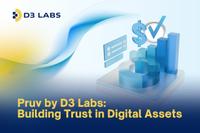Project Wira: Indonesia’s Asset Tokenization Market to Reach $88 Billion by 2030.
Published 8 months ago on November 25, 2024
by Putra Ranu Pradasa

In blockchain’s fast-paced evolution, collaboration fuels innovation. Project Wira, developed by D3Labs, Tiger Research, BRI Ventures, and Saison Capital, explores blockchain’s potential to transform Indonesia’s financial ecosystem. Launched at Indonesia Blockchain Week 2024, with D3Labs as a co-host, it marks a milestone for the industry.
Indonesia’s Asset Tokenization Market
As the world’s fourth most populous country, Indonesia holds a promising potential for asset tokenization. The country’s asset tokenization market is expected to grow 31.7% and reach US$88 billion by 2030. This projection signals significant opportunities for early entrants in the asset tokenization market. Indonesia’s readiness for asset tokenizations is marked by the growth of the digital payment market 2.5 times, reaching US$ 760 billion. The growth of digital payment is showing a similar result. From 2012 to June 2024, QRIS transactions totaled 5,925 million. The growth also shows digital asset adoption among local investors. By the end of 2023, approximately 18.51 million Indonesians, or about 6.7% of the population, hold digital assets accounts— far surpassing the 6.4 million stock investors registered on the Indonesia Stock Exchange (IDX). This highlights the growing prominence of digital assets as a mainstream asset class. Find the full report, here!
Potential for Rapid Adoption of Asset Tokenization in Indonesia.
Indonesia’s asset tokenization market is expected to evolve around commodities and financial instruments such as stablecoins, ETFs, bonds, and debt instruments.
- Digital money (stablecoin, Deposit Token, CBDC)
Indonesia is primed for stablecoin adoption, driven by a young population, rapid digital payment growth, and reliance on remittances and trade. Initiatives like XIDR (StraitsX) and IDRT reflect efforts to develop Rupiah-based stablecoins.
- Commodities sector
Nickel and copper, fueled by the EV industry’s growth, and staples like coal, palm oil, and oil and gas remain in high demand globally. Commodity tokenization offers three key benefits: efficient capital raising, enhanced global competitiveness, and stronger ESG strategies.
- Financial Assets
As of October 2024, Indonesia’s 10-year bond yield at 6.92% surpasses peers with similar credit ratings, offering a 3–4% premium over mature economies. This yield could attract foreign investment via on-chain products, while DeFi innovations diversify financial institutions’ revenue. On-chain asset adoption is set to boost Indonesia’s financial market competitiveness.
- Carbon Credits/ESG Tokens
Blockchain-based tokenization of carbon credits ensures transparent, secure transactions with real-time tracking from creation to retirement. Smart contracts prevent double sales, and data immutability guarantees integrity, creating new business revenue opportunities. - Real Estate
“In our latest collaboration with Bank Tabungan Negara (BTN), Indonesia’s largest mortgage bank, we have initiated the tokenization of securities. These tokenized real estate assets bring new benefits such as additional funding, tax incentives, and asset liquidity for issuing institutions,” said Tigran Adiwirya, Co-CEO and Founder of D3 Labs. “Meanwhile, investors will benefit from affordable property investment alternatives, inflation protection, and transparency.”
Key Technologies for Asset Tokenization
A consensus mechanism is critical to the success of tokenization projects, and a public permission chain is recommended for the initial stage of asset tokenization. Seaseed Network, a prominent initiative within D3 Labs, stands out as one of the leading layer-1 blockchain platforms. It features a public permissioned chain to support enterprise applications across various sectors, including finance, healthcare, and supply management. Chung Ying Lai, co-CEO of D3 Labs, highlighted, “SeaSeed Network pioneers a permissioned public blockchain tailored for financial institutions, partnering with trusted entities like Bank BTN, SaiSon Capital, and UOB Venture Management. By leveraging these partnerships, we ensure secure validator nodes for tokenizing real-world assets (RWAs) and enabling compliant cross-border transactions.”
In conclusion, Indonesia’s asset tokenization market presents immense potential to drive financial innovation and economic growth. With close collaboration between the government, financial institutions, and technology firms, Indonesia is well-positioned to emerge as a Southeast Asian asset tokenization leader.
Latest
Articles / 6 minutes ago
Pruv by D3 Labs: Building Trust in Digital Assets
![Pruv by D3 Labs Building Trust in Digital Assets]()
Press Release / 2 months ago
Kubix and D3 Labs Announce Strategic Collaboration to Explore Global Access for Thai Investment Tokens
![Kubix and D3 Labs Announce Strategic Collaboration to Explore Global Access for Thai Investment Tokens]()
Press Release / 6 months ago
D3 Labs and Orbix Technology Join Forces to Revolutionize Cross-Border Payments and Blockchain Solutions for Financial Services
![D3 Labs and Orbix Technology Join Forces to Revolutionize Cross-Border Payments and Blockchain Solutions for Financial Services]()
Event and Conferences / 8 months ago
What to Expect at Indonesia Blockchain Week 2024
![What to Expect at Indonesia Blockchain Week 2024]()








